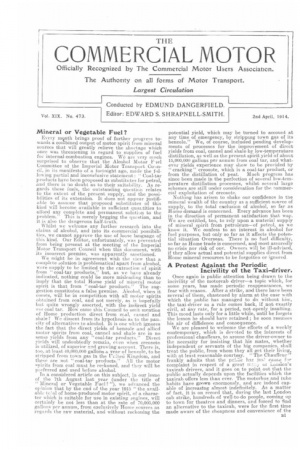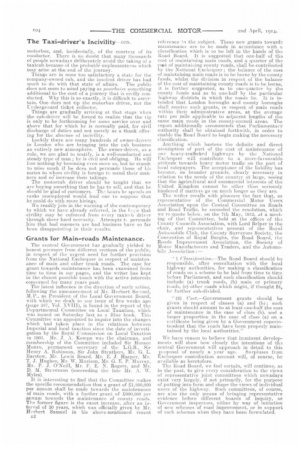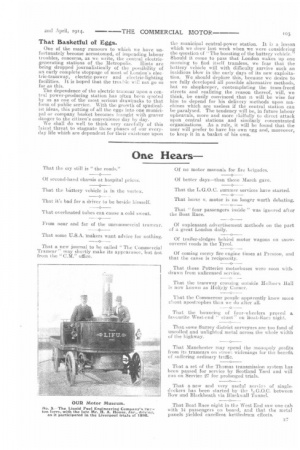Mineral or Vegetable Fuel?
Page 1

Page 2

Page 3

If you've noticed an error in this article please click here to report it so we can fix it.
Every meth brings proof of further progresa towards a combined output of motor spirit from mineral sources that will greatly relieve the shortage which once was threatening in regard to supplies of fuel for internal-combustion engines. WC are very much surprised to observe that the Alcohol Motor Ftel Committee of the Imperial Motor Transport Conn'ail, in its manifesto of a fortnight ago, made the following partial and inconclusive statement : • Coal-tar products have been proposed as substitutes for petrol, and there is no doubt as to their suitability. As regards these fuels, the outstanding question relates to the extent of the present supply, and the possibilities of its extension. It does not appear justifiable to assume that proposed substitutes of this kind will become available in sufficient quitetities to afford any complete and permanent solution to the problem." This is merely begging the question, and it is also the dangerous half-truth.
Whilst we welcome any further research into the claims of alcohol, and into its commercial possibilities, we cannot approve the use of loose language of this kind. Our Editor, unfortunately, was prevented from being present at the meeting of the Imperial Motor Transport Council when this document, with its incorrect premise, was apparently sanctioned.
We might be in agreement with the view that a complete solution is problematical apart from alcohol, were supply to be limited to the extraction of spirit from " coal-tar products," but, as we have already indicated, nothing could i5e more misleading than to imply that the total Home yield of mineral motor spirit is that from " coal-tar products." The suggestion constitutes a false premise. Alcohol, when it conies, will be in competition with all motor spirits obtained from coal, and not merely, as is hopefully but quite wrongly asserted, with the indiia'ect yield vra coal tar. How came this Council to omit mention of Home production direct from mai, cannel and shale ? We dissent from its hypothesis as to the paucity of alternatives to alcohol. It is one which ignores the fact that the direct yields of benzole and allied motor spirits from coal, cannel and shale are in no sense yields from any "coal-tar products." Direct yields will undoubtedly remain, even when creosote is utilized, of superior and growing account. There is, too, at least 40,04)0o0 gallons a year of benzoic, to be stripped from town gas in the Veiled Kingdom, and these Are not " coal-tar products." All the motor Qpirits from coal must be reckoned. and they will be pi eferred and used before aleohol.
In a considered article on this subject, in our issue of the 7th August last year (under the title of " Mineral or Vegetable Fuel ? "), we advanced the opinion that by the end of the year 1915 "the avail able teal of home-produced motor spirit, of a character which is suitable for use in existing engines, will certainly be not less than at the rate of 70,000,000 gallons per annum, from emclusively Herne sources as regards the raw material, and without reckoning the potential yield, which may be turned to account at any time of emergency, by stripping town gas of its benzole." We, of course, included pending developments of processes for the improvement of direct yields from coal, cannel and shale by low-temperature distillation, as well as the present spirit yield of about 15,000,000 gallons per annum front coal tar, and whatever yields experience may show to be provided by " cracking " creosote, which is a, coal-tar product, or from the distillation of peat. Much progress has since been made in the perfection of several low-temperature distillation processes, whilst several large schemes are still under consideration for the eommereial exploitation of creosote.
Nothing has arisen to shake our confidence in the mineral wealth of the country as a, sufficient source of supply, to the total exclusion of alcohol, so far as Home demand is concerned. Every advance has been in the direction of permanentsatisfaction that way. We are entitled2 too, to rely upon a material supply of mineral spirit from petroleum—of petrol, as we know it. We confess to an interest in alcohol for fuel purposes, but only so far as it affects the potential situation Overseas. There is no fuel difficulty, so far as Home trade is contented, and most assuredly no crisis nor risk of one. Owners will be ill-advised, if they allow actual and potential supplies direct from Home mineral resources to be forgotten or ignored.
A Protest Against the Periodic
Incivility of the Taxi-driver.
Once again is public attention being drawn to the incivility of the motorca-b driver—a topic which, for some years, has made periodic reappearances, we fear with reason. After a strike, arid there have been several of them, chastened by alarm at the ease with which the public has managed to do without him, the taxi-driver as a rule comes back, if not exactly civil, at any rate, for a period, not openly insulting. This mood lasts only for a little while, until he forgets the lesson he should have retained ; he soon resumes his air of diffidence and consequence.
We are pleased to welcome the efforts of a weekly contemporary, which is devoted to the interests of professional chauffeurs, to arouse the driver-owner to the necessity for insisting that his mates, whether independent or servants of the big companies, shall treat the public, from whom they all get their living, with at least reasonable courtesy. "The Chauffeur" frankly admits that the peLlic has juslcause for
complaint in respect of a great Tr oi LiAlkn's taxicab drivers, and it goes on to point out that the public actually depends upon the facilities which the taxicab offers less than ever. • The motorbus and tube habits have grown enormously, and are indeed capable of increasIng almost indefinitely. As a matter of fact, it is on record that, during the last London cab strike, hundreds of well-to-do people, coming up to town for theatres and dinners, and forced to 'find an alternative to the taxicab, were for the first time made aware of the cheapness and convenience of the motorbus, and, incidentally, of the courtesy of its conductor. There is no doubt that many thousands of people nowadays deliberately avoid the taking of a taxicab because of the probable unpleasantness which may arise at •the. end of the journey.
Things are in none too satisfactory a state for the company-owned cab, and the insolent driver has had much to do with that state of affairs. The public does not seem to mind paying as pourboire something additional to the cost of a journey that is civilly conducted. Why this is so exactly, it is difficult to ascertain. One does not tip the motorbus driver, nor the Undergsound ticket collector.
Things are gradually arriving at that stage when the cab-driver will be forced to realize that the tip is only to be forthcoming for some service over and above that for which he is normally paid, for civil discharge of duties and not merely as a thank offering for the absence of incivility.
Luckily there are many hundreds of owner-drivers in London who are bringing into the cab business an entirely new atmosphere. The owner-driver, as a rule, we are glad to testify, is a well-conducted and steady type of man; he is civil and obliging. He will lose nothing by becoming even more so, but he stands to miss much if he does not persuade those of his mates to whom civility is foreign to mend their manners and so." increase their takings.
The motoreab driver should be taught that we are buying something that he has to sell, and that he should be glad of customers. The hours he spends on ranks unemployed would lead one to suppose that he could do with more hirings. We readily join in the warning of the contemporary to which we have already referred, in the h.f.pe that .civility may be enforced from every taxice b driver through sheer hard necessity. Attempts ti persuade .him that bad manners are bad business have so far been disappointing in their results.
• Grants for Main-roads Maintenance.
The central Government has gradually yielded to honest pressure from dill ereet sections of the public, in respect of the urgent need for further provision from the National Exchequer in respect of maintenance of main and. other trunk roads. The case for grant towards maintenance has been examined from time to time in our pages, and the writer has kept in the closest possible touch with the active interests
• concerned for many years past.
The latest influence in the direction of early action, _following the announcement of Mr. Herbert Samuel, M.P., as President of the Local Government Board, with which we dealt in our issue of five weeks ago .(page 587, Vol. XVIII), is found in the report of the Departmental Committee on Local Taxation, which was issued on Saturday last as a Blue book. This • Conunittee was appointed to inquire into the changes which had taken place in the relations between Imperial and local taxation since the date of investigation by the Royal Commission on Local Taxation in 1901. Mr. J. A. Kempe was the chairman, and _membership of the Committee included Sir Horace Monro, permanent secretary of the L.G.B., Sir Henry A. Robinson, Sir John Struthers, Mr. G. L. 'Barstow, Mr. Lewis Beard, Mr. E. J. Harper, Mr. T. J. Hughes, Mr. W. Munson, Mr. G. E. P. Murray, Mr. P. J. O'Neill, Mr. F. E. N. Rogers, and Mr. P. M. Stevenson (succeeding the late Mr. A. W. Myles).
It is interesting to find that the Committee makes the specific recommendation that a grant of 21,900,000 per annum shall be made towards the maintenance of main roads, with a further grant of £600,000 per -annum towards the maintenance of county roads. The former figure is the exact increase, after an interval of 20 years, which was officially given by Mr. Herbert Samuel in his above-mentioned recent 112 reference !o the subject. These new grants tower& maintenance are to be made in accordance with a classification which is to be left in the hands of the Road Board. It is suggested that one-half of the cost of maintaining main roads, and a quarter of the ccstit of maintaining county roads, shall be contributed by the National Lxchequer ; the balance of the cost of maintaining main roads is to be borne by the county funds, whilst the division in respect of the balance of the cost of maintaining county roads is to be borne, it is further suggested, as to one-quarter by the county funds and as to one-half by the particular highway districts in which the roads lie. It is intended that London boroughs and county boroughs shall receive such grants, in respect of main roads within their administrative areas, at the average rate per mile applicable to adjacent. lengths of the same main roads in the county-council areas. The report additionally m ecommends that Parliamentary authority shall be obtained forthwith, in order to enable the Road Board to begin making the necessary classification.
Anything which hastens the definite and direct assumption of part of the cost of maintenance of our heavy-trafficked highways by the National Exchequer will contribute to a more-favourable attitude towards heavy motor traffic on the part of local ratepayers. The acceptance of the liability has become, on broader grounds, clearly necessary in relation to the needs of the country at large, seeing that the agricultural and commercial interests of the United Kingdom cannot he other than seriously hindered if matters go on much longer as they are.
The writer recalls with pleasure the fact that, as representative of the Commercial Motor Users Association upon the Central Committee on Roads and Road Traffic, lie seconded the resolution, which we re-quote below, on the 7th May, 1913, at a meeting of that Committee, held at the offices of the County Councils Association, with Lord Belper in the chair, and representatives present of the Royal Automobile Club, the County Surveyors Society, the Convention of Royal Burghs, the Road Board, the Roads Improvement Association, the Society of Motor Manufacturers and Traders, and the Automobile _Association :—
" 1 Classification.—The Road Board should be responsible, after consultation with the local highway authorities, for making a classification of roads on a scheme to be laid from time to time before Parliament., and such classification should include (a) trunk roads, (b) main or primary roads, (c) other roads which might, if thought fit, be further sub-divided.
"(2) Cost.—Government grants should be given in respect of classes (a) and (b); such grants should amount to at least one-half the mat of maintenance in the case of class (b), and a larger proportion in the case of class (a) on a certificate being given by a Government superintendent that the roads have been properly maintained by the local authorities."
We have reason to believe that imminent developments will show how closely the intentions of the central Government will approach in detail to this proposal of nearly a year ago. Surpluses from Exchequer contribution account will, of course, be available as heretofore.
The Road Board, we feel certain, will continue, as in the past, to give every consideration to the views of representative joint committees which nowadays exist very largely, if not primarily, for the purpose of putting into form and shape the views of individual users of the highway. Such committees, of course, are also the only means of bringing representative evidence before different boards of inquiry, or Government inspectors, either by way of initiation of new schemes of road improvement, or in support of such schemes when they have been formulated.
One of the many rumours to which we have unfortunately become accustomed, of impending labour troubles, concerns, as we write, the central electricgenerating stations of the Metropolis. Hints are being dropped journalistically of the possibility of art early complete stoppage of most of London's elec• trie-tramway, electric-power and electric-lighting facilities. It is hoped that the troi,ble will net go so far as this.
The dependence of the electric tramcar upon a central power-producing station has often been quoted by us as one of the most serious drawbacks to that form of public service. With the growth of syndicalist ideas, this putting of all the eggs into one municipal or company basket becomes it aught with graver danger to the citizen's convenience day by day. We shall do well to think very carefully of this latest threat to stagnate those phases of our everyday life which are dependent for their existence upon the municipal central-power station. It is a lesson which we drew last week when we were considering the question of "The boosting of the battery vehicle." Should it come to pass that London wakes up one morning to find itself tramless, we fear that the battery vehicle will with difficulty survive such an insidious blow in the early days of its new exploitation. We should deplore this, because we desire to see fully developed all possible alternative methods, but no shopkeeper, contemplating the tram-freed streets and realizing the reason thereof, will, we think, be easily convinced that it will be wise for him to depend for his delivery methods upon machines which are useless if the central station can be paralysed. The tendency will be, in future labour upheavals, more and more rkilfully to direct attack upon central stations and similarly concentrated organizations. As a rule, it will be found that the user will prefer to have his own egg and, moreover, to keep it in a basket of his own.






















